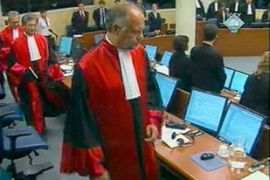Serbia cleared of causing genocide
International court confirms earlier ruling on 1995 Srebrenica genocide only.

It is the first time that the ICJ, the UN’s top court, has ruled that an event was genocide, which was made an international crime under a 1948 treaty after the Nazi Holocaust.
It is also the first time that a state has been tried for genocide.
However, in the same ruling the court has also said that the mass killings in other parts of Bosnia during the 1992-95 war did not constitute genocide.
“The court finds it has not been established by [Bosnia] that the killings amounted to genocide,” Higgins said.
Ethnic cleansing
Bosnia has accused Serbia of masterminding the widespread “ethnic cleansing” of Bosnian Muslims and Croats during the 1992-95 war, saying it amounted to genocide.
| Your Views | ||
|
In its ruling, the court said that Serbia “was making considerable military and financial support available to the [Bosnian Serb entity] Republika Srpska” during the Bosnian war, but did not make any immediate comment about specific involvement in genocide.
If the final verdict had been in favour of Bosnia, Serbia would have been liable for billions of dollars in compensation to Bosnia.
More than 100,000 people died in the Balkans war between 1992 and 1995; it triggered the break-up of the former Yugoslavia.
Bosnia’s Muslims and Croats wanted to cut all ties with the capital, Belgrade, a move that was opposed by Bosnian Serbs.
About 8,000 Muslims from Srebrenica and surrounding villages were killed in July 1995. The bodies of about half have been found in more than 80 mass graves in the area.
Reactions
Serbia has said that a ruling against it will prove an unjust and lasting stigma on the state, which overthrew its wartime leader Slobodan Milosevic in 2000.
|
“A ruling that Serbia committed genocide in Bosnia means everything to me” Hedija Krdzic, who lost her husband, father and grandfather at Srebrenica in eastern Bosnia |
In Bosnia, now split between a Muslim-Croat federation and a Serb Republic, sentiment is split along ethnic lines, with Muslims hoping the court will brand Serbia an aggressor.
About 50 people demonstrated outside the court on Monday in favour of a genocide verdict.
“A ruling that Serbia committed genocide in Bosnia means everything to me,” said 34-year-old Hedija Krdzic who lost her husband, father and grandfather at Srebrenica in eastern Bosnia.
“Without such a ruling I fear that one day the massacre will be forgotten.”
Al Jazeera’s Alan Fisher reported from Sarejevo that the verdict was received by the Bosnians with “anger, resentment and even resignation”.
“Because the Bosnians believed that they took the action not just for themselves but for every country threatened by genocide.
“Now they feel they are badly let down by the world court.”